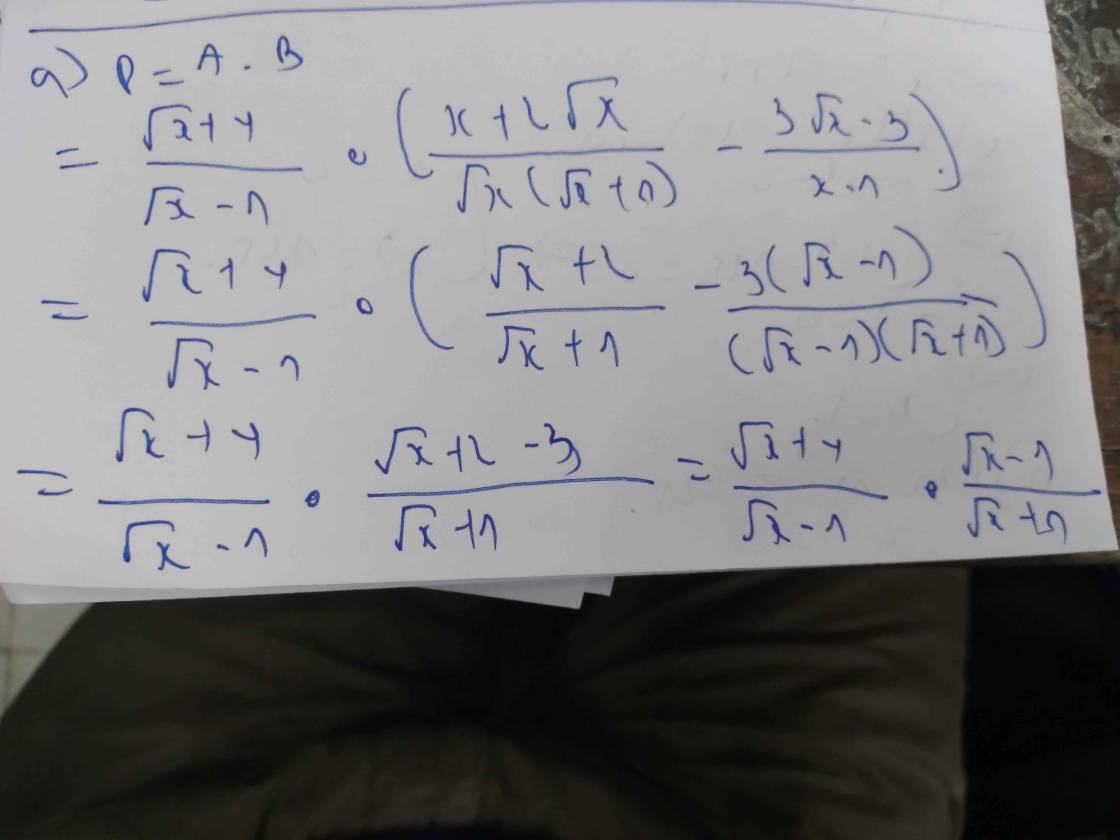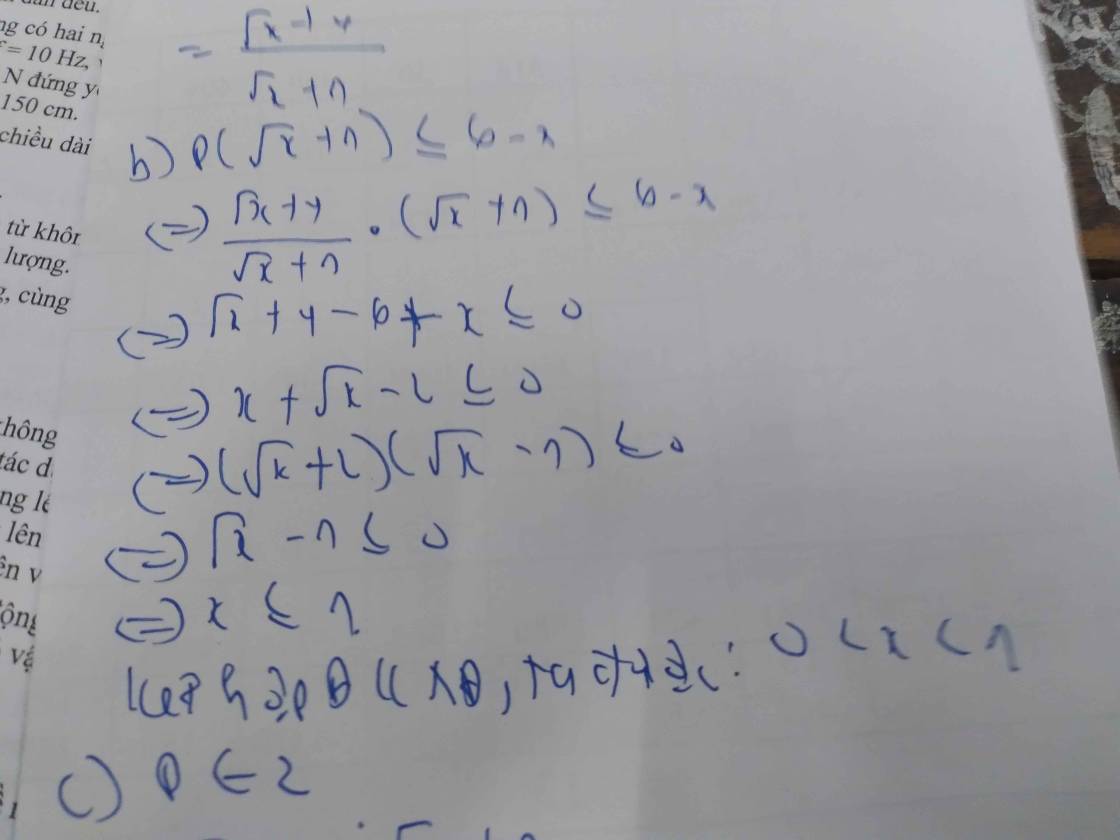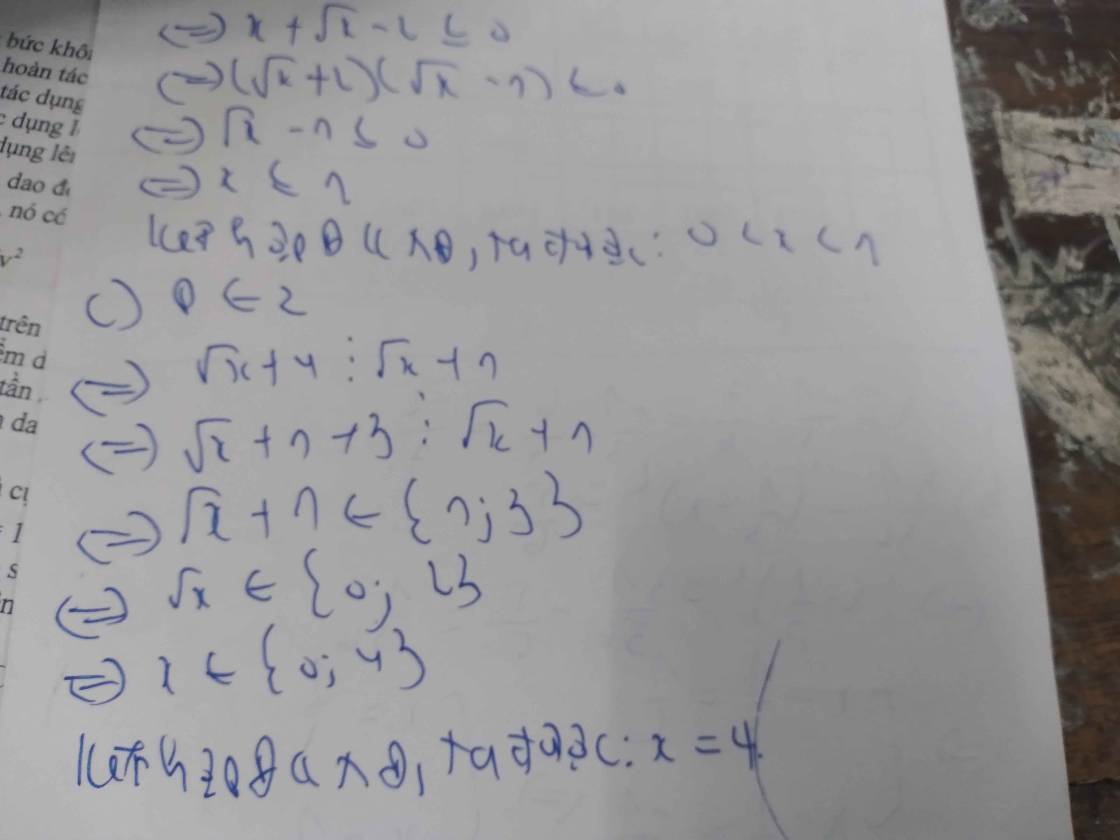tìm x nguyên để \(6\sqrt[]{x+1}\)chia hết cho \(2\sqrt[]{x-3}\)

Những câu hỏi liên quan
Tìm x nguyên để: 6\(\sqrt{x}\)+1 chia hết cho 2\(\sqrt{x}\)-3
Tìm x nguyên để \(6\sqrt{x}+1\) chia hết cho\(2\sqrt{x}-3\)
Tìm x nguyên để \(\sqrt{x}+1\) chia hết cho \(\sqrt{x}-3\)
Tìm x nguyên để \(\sqrt{x}+1\)chia hết cho \(\sqrt{x}-3\)
Tìm x nguyên để : \(\sqrt{x}+1\)chia hết cho \(\sqrt{x}-3\)
Có \(\sqrt{x}+1⋮\sqrt{x}-3\)
\(\sqrt{x}+3⋮\sqrt{x}-3\)
=> \(\left(\sqrt{x}+1\right)-\left(\sqrt{x}-3\right)⋮\sqrt{x}-3\)
=> \(4⋮\sqrt{x}-3\)
=> \(\sqrt{x}-3\in\left\{-4;-2;-1;1;2;4\right\}\)
=> \(\sqrt{x}\in\left\{-1;1;2;4;5;7\right\}\)
Loại trường hợp \(\sqrt{x}=-1\)
=> \(x\in\left\{1;4;16;25;49\right\}\)
Đúng 0
Bình luận (0)
tìm x nguyên để \(\sqrt{x+1}\) chia hết cho \(\sqrt{x-3}\)
A=\(\dfrac{3\sqrt{x}-6}{x-2\sqrt{x}}+\dfrac{\sqrt{x}-3}{\sqrt{x}}-\dfrac{1}{2-\sqrt{x}}\) và B=\(\dfrac{\sqrt{x}-2}{\sqrt{x}+9}\)
Cho P=A.B. Tìm số nguyên x để \(\sqrt{P}< \dfrac{1}{3}\)
Ta có: \(P=A\cdot B\) (ĐK: \(x>0;x\ne4\))
\(=\left(\dfrac{3\sqrt{x}-6}{x-2\sqrt{x}}+\dfrac{\sqrt{x}-3}{\sqrt{x}}-\dfrac{1}{2-\sqrt{x}}\right)\left(\dfrac{\sqrt{x}-2}{\sqrt{x}+9}\right)\)
\(=\left[\dfrac{3\left(\sqrt{x}-2\right)}{\sqrt{x}\left(\sqrt{x}-2\right)}+\dfrac{\sqrt{x}-3}{\sqrt{x}}+\dfrac{1}{\sqrt{x}-2}\right]\left(\dfrac{\sqrt{x}-2}{\sqrt{x}+9}\right)\)
\(=\left(\dfrac{3+\sqrt{x}-3}{\sqrt{x}}+\dfrac{1}{\sqrt{x}-2}\right)\left(\dfrac{\sqrt{x}-2}{\sqrt{x}+9}\right)\)
\(=\left(1+\dfrac{1}{\sqrt{x}-2}\right)\left(\dfrac{\sqrt{x}-2}{\sqrt{x}+9}\right)\)
\(=\dfrac{\sqrt{x}-1}{\sqrt{x}-2}\cdot\dfrac{\sqrt{x}-2}{\sqrt{x}+9}\)
\(=\dfrac{\sqrt{x}-1}{\sqrt{x}+9}\)
Với x > 0; x ≠ 4 thì \(\sqrt{P}< \dfrac{1}{3}\Leftrightarrow P< \dfrac{1}{9}\)
\(\Leftrightarrow\dfrac{\sqrt{x}-1}{\sqrt{x}+9}< \dfrac{1}{9}\)
\(\Leftrightarrow\dfrac{\sqrt{x}-1}{\sqrt{x}+9}-\dfrac{1}{9}< 0\)
\(\Leftrightarrow\dfrac{9\left(\sqrt{x}-1\right)}{9\left(\sqrt{x}+9\right)}-\dfrac{\sqrt{x}+9}{9\left(\sqrt{x}+9\right)}< 0\)
\(\Leftrightarrow\dfrac{9\sqrt{x}-9-\sqrt{x}-9}{9\sqrt{x}+81}< 0\)
\(\Leftrightarrow\dfrac{8\sqrt{x}-18}{9\sqrt{x}+18}< 0\)
Ta thấy: \(9\sqrt{x}+18>0\forall x\)
\(\Rightarrow8\sqrt{x}-18< 0\)
\(\Rightarrow\sqrt{x}< \dfrac{18}{8}\)
\(\Rightarrow\sqrt{x}< \dfrac{9}{4}\Leftrightarrow x< \dfrac{81}{16}\)
Kết hợp với điều kiện, ta được: \(0< x\le5\)\(;x\ne4\)
\(\Rightarrow x\in\left\{1;2;3;5\right\};x\in Z\) thì \(\sqrt{P}< \dfrac{1}{3}\)
#Urushi
Đúng 3
Bình luận (0)
Cho A= \(\dfrac{\sqrt{x}+4}{{}\sqrt{x}-1}\) và B= \(\dfrac{x+2\sqrt{x}}{\sqrt{x}(\sqrt{x}+1)} -\dfrac{3\sqrt{x}-3}{x-1}\) (đk: x>0,x≠1)
a) Rút gọn P=A.B
b) Tìm x để P(\(\sqrt{x}+1\)) ≤ 6-x
c) Tìm x để P nhận giá trị nguyên
Tìm x; y nguyên :
\(\left(6\sqrt{x}+1\right)\)Chia hết cho \(\left(2\sqrt{x}-3\right)\)
Bài 5. Cho biểu thức: C = \(\dfrac{2\sqrt{x}-3}{\sqrt{x}-2}\) 𝑣ớ𝑖 𝑥 ≥ 0; 𝑥 ≠ 4. Tìm x nguyên để C đạt giá trị nguyên nhỏ nhất
Bài 6. Cho biểu thức: D = \(\dfrac{x-3}{\sqrt{x}+1}\) với 𝑥 ≥ 0; 𝑥 ≠ 1. Tìm x nguyên để D có giá trị là số nguyên
Bài 5:
\(C=\frac{2\sqrt{x}-3}{\sqrt{x}-2}=\frac{2(\sqrt{x}-2)+1}{\sqrt{x}-2}=2+\frac{1}{\sqrt{x}-2}\)
Để $C$ nguyên nhỏ nhất thì $\frac{1}{\sqrt{x}-2}$ là số nguyên nhỏ nhất.
$\Rightarrow \sqrt{x}-2$ là ước nguyên âm lớn nhất
$\Rightarrow \sqrt{x}-2=-1$
$\Leftrightarrow x=1$ (thỏa mãn đkxđ)
Đúng 0
Bình luận (0)
Bài 6:
$D(\sqrt{x}+1)=x-3$
$D^2(x+2\sqrt{x}+1)=(x-3)^2$
$2D^2\sqrt{x}=(x-3)^2-D^2(x+1)$ nguyên
Với $x$ nguyên ta suy ra $\Rightarrow D=0$ hoặc $\sqrt{x}$ nguyên
Với $D=0\Leftrightarrow x=3$ (tm)
Với $\sqrt{x}$ nguyên:
$D=\frac{(x-1)-2}{\sqrt{x}+1}=\sqrt{x}-1-\frac{2}{\sqrt{x}+1}$
$D$ nguyên khi $\sqrt{x}+1$ là ước của $2$
$\Rightarrow \sqrt{x}+1\in\left\{1;2\right\}$
$\Leftrightarrow x=0; 1$
Vì $x\neq 1$ nên $x=0$.
Vậy $x=0; 3$
Đúng 0
Bình luận (0)
Bài 6:
Để D nguyên thì \(x-3⋮\sqrt{x}+1\)
\(\Leftrightarrow\sqrt{x}+1\in\left\{1;2\right\}\)
\(\Leftrightarrow\sqrt{x}\in\left\{0;1\right\}\)
hay \(x\in\left\{0;1\right\}\)
Đúng 0
Bình luận (0)




















